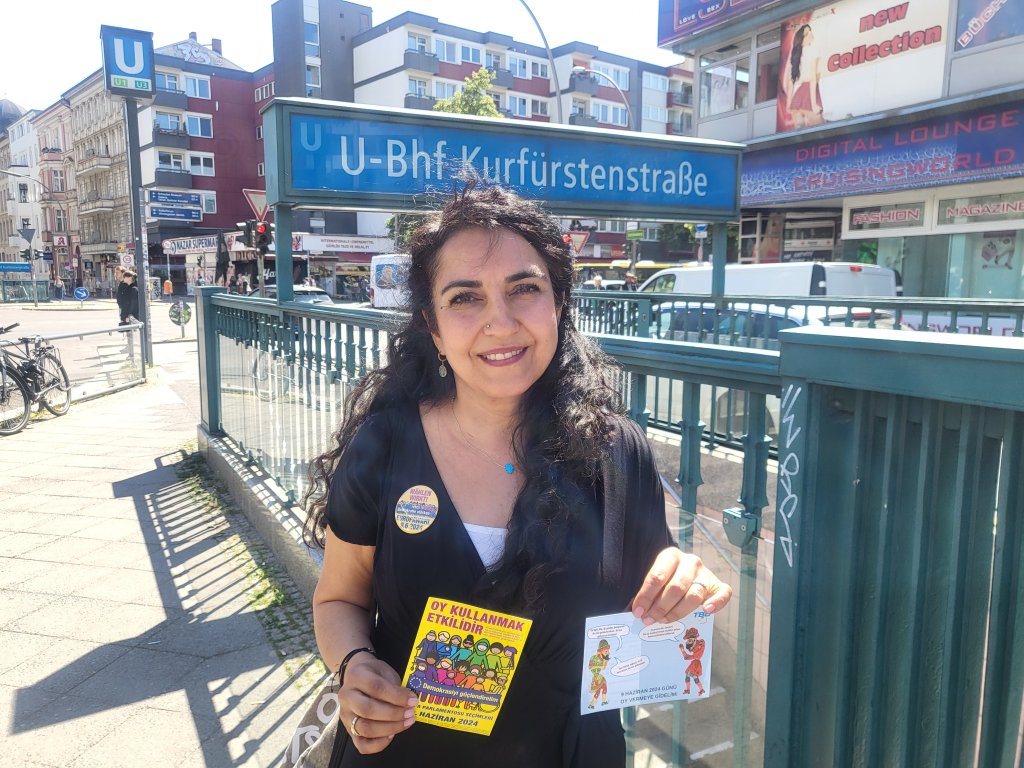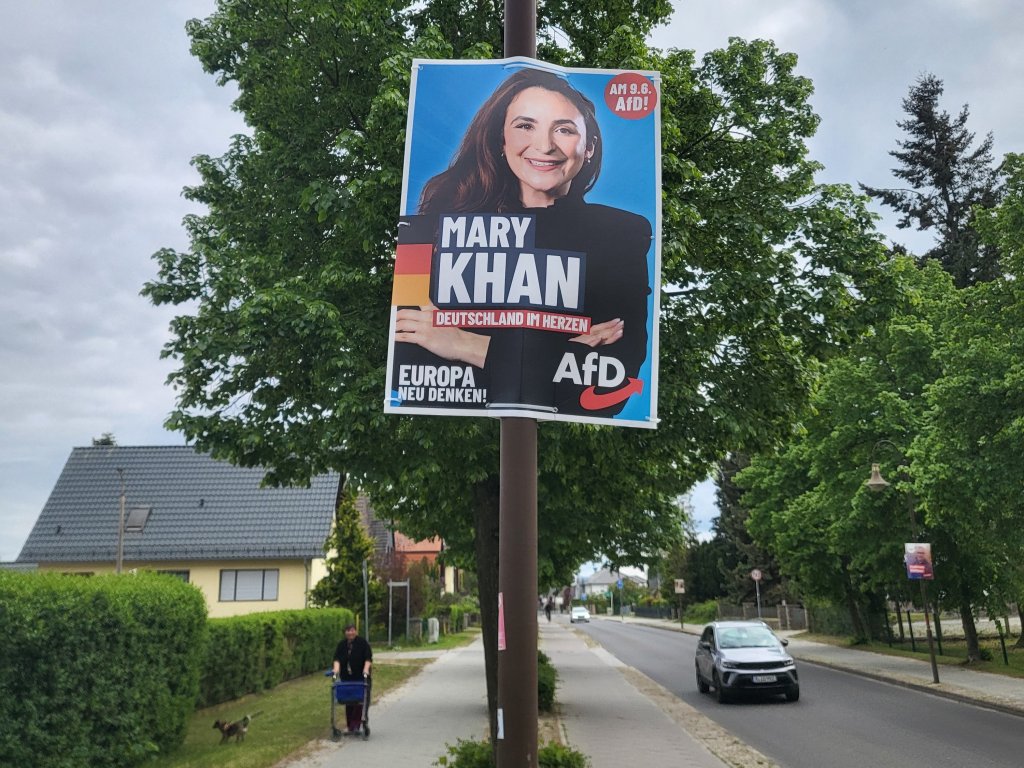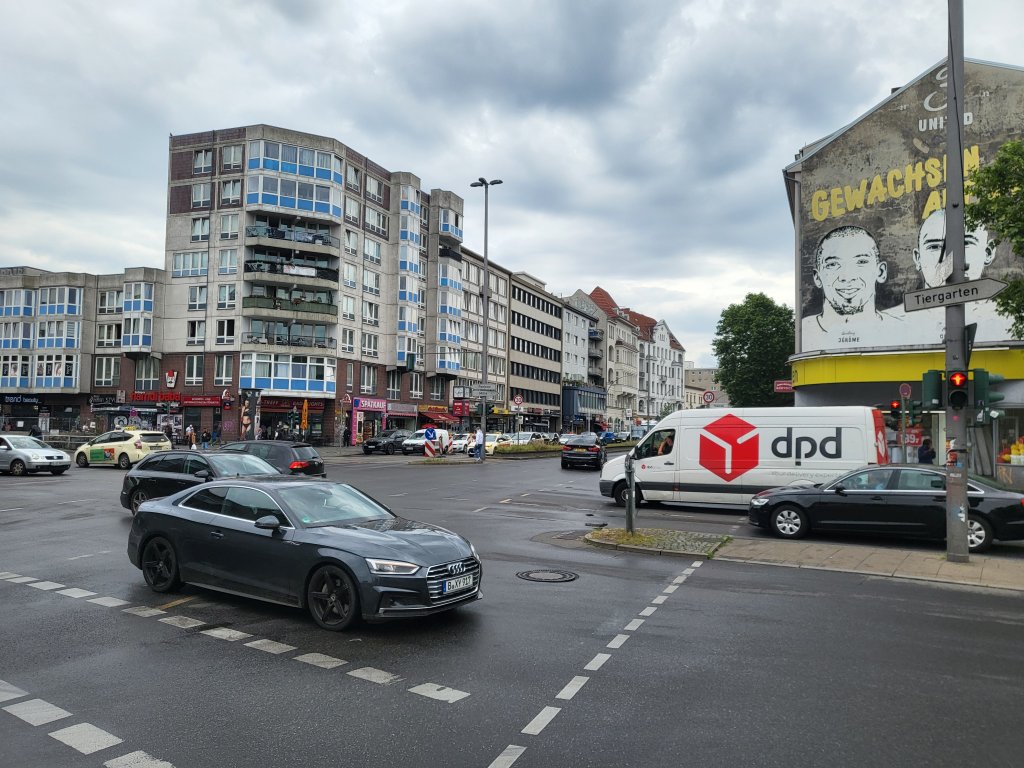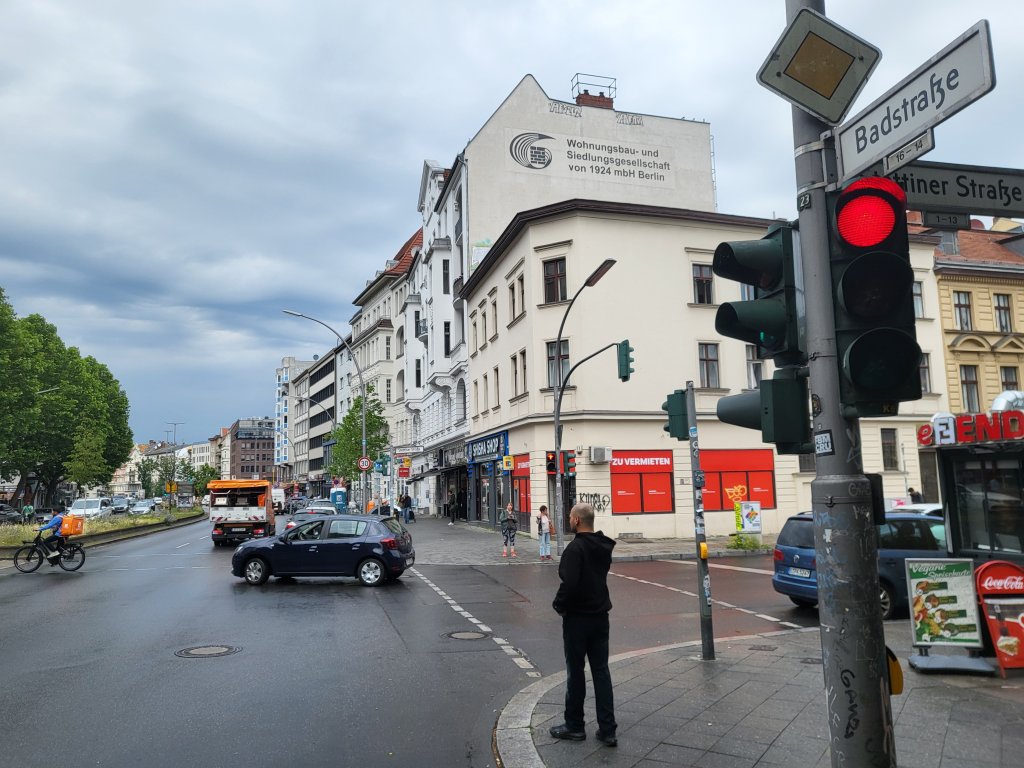The far-right AfD is aggressively wooing migrant voters – with the help of those with international backgrounds within its own ranks and influencers on TikTok. That's despite the party's strong stance against immigration and links to extreme German nationalism.
In Berlin's relatively multicultural society, one particular district stands out above the rest. In Wedding, more than half of the population have an immigrant background, according to 2021 figures, and less than two-thirds have German citizenship. Wedding's main street is lined with Turkish supermarkets, Syrian restaurants and shops with Arabic names.
Here, in the run-up to elections for the European Parliament, campaign posters of every major party are plastered everywhere -- with one noticeable exception: the far-right populist Alternative for Germany, or AfD, which has been consistently campaigning against foreigners and Islam since it was founded in 2013.
Of around 20 people – all with an international background – whom InfoMigrants spoke to in this suburb, not one held any sympathy for the AfD, let alone being prepared to give the party their vote at the ballot box.
Beyond the streets of Wedding, about 15 percent of the more than 60 million Germans eligible to vote this week in the European elections have an international background – meaning they or at least one of their parents was not born in Germany.
And in a strategy observers say is aimed at downplaying the party's anti-immigrant ideologies, the AfD, parts of which are considered far-right extremist, has been increasingly fishing for support from these votes.

Naje, a second-generation immigrant with Angolan-Congolese roots, says the AfD is racist and misogynistic. "My parents worked hard here to make a living, they came a long way," the first-time voter tells InfoMigrants. "The AfD wants to keep immigrants out, I don't like that," she added, referring to the "remigration" plan put forth by some AfD politicians that would force millions of foreigners and even Germans with an immigration background to leave the country. Following the January revelation, which prompted large-scale protests across Germany, the AfD dropped in the polls.
Business partners Ali and Dandun, two middle-aged men of Palestinian and Turkish origins, respectively, hold similar views. "Why would I vote for a party that hates me?," Ali asks rhetorically, adding that he served in Afghanistan for the German armed forces. "My service isn't recognized in Germany. It doesn't really matter who we simple folks vote for. The politicians do what they want anyway," he adds.
My parents' and grandparents' generations helped rebuild Germany, which is my homeland. I cannot leave.
Despite sharing Ali's belief that politicians working at the national level don't take issues like education, pensions and earning a living wage seriously, Dandun's political apathy does not change his principle of not voting for the AfD. "The AfD wants us to return to our homeland, but I was born here and have built up something here. My parents' and grandparents' generations helped rebuild Germany, which is my homeland. I cannot leave."
The far-right migrant vote phenomenon
Research into the voting behavior of migrants in Germany does not suggest that they are exempt from voting for far-right parties. In fact, according to Naika Foroutan, Director of the German Center for Integration and Migration Research (DeZIM), the voting behavior of people with a migration history today usually doesn't differ from that of non-immigrant voters -- not only in Germany, but across the European Union.
"It might be surprising that the immigrant votes for the AfD do not differ from non-immigrant votes," Foroutan tells InfoMigrants. "It's counter-intuitive that immigrants consider voting for a party that is so consistently anti-immigrant.
So why would people with a migration history vote for a party with some members who call for "remigration"?
According to Foroutan's research, which she says is mostly anecdotal and not quantitative at this stage, there are several main reasons:
- a desire to cross lines as well as change normative borders and politics by voting for right-wing parties, which makes them feel "avantgarde";
- the protest vote phenomenon -- not feeling represented or understood by any party, beliefs like 'no party except the AfD is trying to get our votes' as well as frustration over Germany's migration policy;
- over-assimilation: Migrants want to be 'good foreigners' in order to counter the fear of the AfD's "remigration" plans;
- prevalent status hierarchy and internalized racism: Especially migrants who have been in Germany for a longer time perceive themselves as well-integrated and sometimes view newcomers with suspicion, seeing them as a potential threat to their status or with envy for supposedly being better off, especially in times of crisis.
How the AfD fishes for migrant votes
In Germany's last federal elections in 2021, the AfD received 10.4 percent of the vote. This result was due to support for the party from Germans of Russian origin, who make up the third-largest immigrant group in Germany behind people with Polish and Turkish roots.
Perhaps because of its relative popularity among Russian Germans, the AfD started to branch out last year by "consistently" trying to appeal to Muslim voters, according to Foroutan.
"It's really counterintuitive given the AfD's strict anti-Islam agenda, but if they want to get more immigrant votes, they need to go and fish for a new clientele," she says.
One way the AfD targets Turkish-German voters, who make up almost half of all Muslims in Germany, is by spreading the narrative that Germans and Turkish are brothers in arms, as allegedly demonstrated by the alliance between the Ottoman and German Empires in World War I.
"Turks in Germany should vote for the AfD," Maximilian Krah, the AfD's top candidate for the EU elections who's currently under fire for his alleged ties to Russia and China, says in a YouTube video from last September.
In other videos and messages, according to Foroutan, the AfD uses anti-gender narratives and pits Germans of Turkish origin against newcomers like Syrians, saying the latter would take away Turkish jobs and work.
Ayşe Demir, spokesperson for the Turkish Union Berlin-Brandenburg, says this kind of rhetoric falls on fertile ground, albeit within limits. "Some of them have anxieties fuelled by their envy of Syrians with good diplomas," Demir explains. "Others aren't satisfied with the politics of the democratic parties or have sympathies for the AfD due to the politics of their country of origin. Still others are secular and are afraid of creeping Islamization."

How does the AfD use migrants for its own ends?
The Alternative for Germany, which has lost around seven percentage points in national approval ratings over the past five months, started to include immigrants into the party in around 2016/17, says Humboldt University researcher Özgür Özvatan, who specializes in migration, integration, radicalization and social media, among other subjects.
Last year, state AfD politician Robert Lambrou founded a club titled 'With a migration background for Germany', whose stated goal is to "encourage people with a migration background to join or support" the AfD. A survey from June 2023 found that around 4.5 percent of all AfD politicians at the state level had a migration history, which was below the average of all parties (7.2. percent).
Lambrou, whose father is Greek, and around 50 other members, including the native-born Iranian Meysam Ehtemai, vehemently claim that the AfD is not racist.
In a recent Süddeutsche Zeitung article, a professor of political science called this placing of single party members with a migration history in the foreground a "strategy of self-trivialization" with the goal of "immunizing the party against criticism of its xenophobic character", a tactic the far-right Rassemblement National has reportedly pursued for years.
Asked about this criticism, AfD politician Mary Khan -- a member of the club and one of the most high-profile AfD politicians with a migration history -- told InfoMigrants: "there's nothing to trivialize in the AfD."
"The AfD is a completely normal democratic party," she says, disputing that the majority of her party is right-wing extremist. She also claims that said "remigration" plans were allegedly misinterpreted; in reality, the concept was "mainly about measures and incentives for a constitutional and legal return of foreigners who are required to leave the country to their home countries."
This week's revelation that the AfD almost made "remigration" the macabre slogan of its election campaign with EU candidate Krah last year casts some doubt on this version, however.
Tokenism: trying to give the AfD a non-racist image
Khan's father fled to Germany in the 1970s because he was prosecuted in his native Pakistan for practicing Sufism and advocating for secularization, she says.
She started to become politicized at the age of 19, when her father wrote a critical book about fundamentalist Islamist movements and survived two assassination attempts, according to Khan.
Initially, she was sympathetic to the conservative CDU/CSU -- until more than 1.3 million people came to Europe and requested asylum in 2015/16, which prompted her to join the Alternative for Germany.
"I couldn't understand why one lets so many people come here in an uncontrolled manner," she tells InfoMigrants, pointing to concerns about fundamentalist movements.
Khan, who is running for the European elections for the AfD in her home state of Brandenburg, last year added to the AfD's scandal-ridden European election campaign: Due to imprecise information in her resume, an allegation she denies, she's facing a two-year ban from holding party office.
The 30-year-old says Germany is not a country of immigration. And she says skilled labor migration is the key, while "war refugees" like Syrians should return to their home countries once it's safe to do so.

"Those who came to Germany as war refugees and successfully applied for asylum, they have to return to Syria when the war is over. This is what we want," Khan says, adding she believes this is the goal of many of them. This doesn't apply to those with German citizenship.
According to migration researcher Foroutan, AfD politicians with an immigration background can not only give the party a non-racist image, they can also inform the party on how immigrant communities tick. "They work as role models. With them, potential AfD voters may think: 'If she's already a member of the party, I can vote for them because they accept people like me'."
Foroutan believes they can make a difference at the ballot box. "We know from voters' preferences that they tend to vote for people with similar lifestyles, backgrounds, religions."
'The AfD dominates the political realm on TikTok'
According to migration researcher Özvatan, the AfD made a fundamental change in its voter outreach activities last year.
"In August or September, they started to strategically target immigrants on social media," Özvatan explains to InfoMigrants. "They tried older generations first as they had the feeling that some of them were upset about the intake of the large number of refugees in 2015/16."
Their platform of choice: TikTok, where the AfD was the only player among Germany's major parties until recently. No other party uses the platform, which is especially popular among young people, as skillfully as the AfD. This is particularly significant because the EU elections will be the first time 16- and 17-year-olds can vote; more than 45 percent of minors in Germany were themselves, or have one or both parents, born abroad.
"The AfD dominates the political realm on TikTok," says Özvatan. One reason is the recommendation algorithm, which "is the best one around," according to Özvatan: "With the first 1,000 interactions, it will very quickly identify communities that might interact with a given video."
TikTok's algorithm is so sophisticated that it allows for sending tailored messages to specific communities -- without running the risk of other parts of the electorate seeing videos, etc. that could alienate them, Özvatan says.
Of all German parties on TikTok, the AfD has a dominant share of followers (73 percent) -- a figure that doesn't factor in another group that disseminates pro-AfD messages on the social media platform.
Swaying migrant voters from the AfD's periphery
Influencers, particularly those promoting Islam- and Muslim-friendly content, might be more threatening than the party's own messages itself, Özvatan says. "The influencers legitimize a party that tries to undermine democracy."
"On the AfD's periphery on TikTok, you have a whole cosmos of influencers, many of whose messages are channeled through masculinity. They say things like 'This whole wokeness made our women become less traditional. But we want them to be traditional housewives'."
Although it's not clear how many of these pro-AfD influencers exist or how close their ties are to the AfD, they are "essential" for the AfD's outreach and mostly address people with Turkish roots, he adds.
In a short video from last September, a German TikTok influencer of Turkish origin with more than 200,000 followers calls on migrants in Germany to be humble and polite. "Even if you were born here, you are a guest in this country." Midway through the video, he briefly shows the blue and red AfD logo while remarking: "I'm not trivializing racism or exclusion, but don't be surprised if more and more people vote for the AfD. How would you like it if somebody came to your country and insulted you?"
Mohammed, a 30-year-old German with Palestinian-Syrian roots, has mixed feelings about the message of the video. "I was born in Berlin and I don't feel like a guest here, even though my skin color is different," he tells InfoMigrants. "But in principle, he [the TikTok influencer] is right: Newcomers like refugees first need to integrate and show that they can behave." While he won't give his vote to the AfD, he says, he supports their campaign pledge of deporting criminal foreigners. "I want to live in a peaceful country."
Özvatan says he and his colleagues have been observing a "specific kind of immigrant influencer" producing pro-AfD content for the past six to nine months. He wrote recently in the Süddeutsche Zeitung, "the AfD and its periphery of influencers are picking up politically dissatisfied people in order to radicalize them."
Despite their impact, the full extent of their influence remains unlcear due to limited research. What worries Özvatan, however, is that democratic parties don't yet have this periphery.
Can the AfD's strategy succeed?
Back in Berlin's Wedding quarter, David, who is from Nigeria, says he was studying engineering in Ukraine when Russia invaded in 2022. The 37-year-old escaped to Germany, where he says he wants to stay long-term, despite the daily challenges he encounters. "Certain parts of the immigration process -- basic requirements like a job, paying insurance and rent -- are pretty complicated, especially for colored people like myself."
If he were eligible to vote in the EU elections, he says, he'd support the social democrats. "I wouldn't vote for parties concerned with old, white Germans like the AfD. They don't support immigrants from third-world countries," he says, adding that he doesn't know any third-country national like himself who's willing to vote for AfD.

Social media and radicalization expert Özgür Özvatan says the AfD might soon also make an effort to appeal to people who came to Germany as refugees.
"I can see them trying to integrate a refugee candidate into the party so they can whitewash their programmatic manifesto/offer," he tells InfoMigrants. "It would allow them to say 'Look, we are not against all refugees, only against criminal ones, and so forth.'" Another plausible next step for the AfD, he adds, would be to nurture a refugee influencer ahead of the next federal elections, which are expected to take place in late summer or fall 2025.
'Democratic parties don't target immigrants'
Foroutan believes a growing share of people with a migration history among the electorate -- it's estimated that by 2030, 50 percent of voters under 18 will have an immigrant background -- isn't enough unless Germany's democratic parties start taking the immigrant factor seriously. They are the conservatives (CDU/CSU), the social democrats (SPD), the Greens, the Liberals (FDP) and the Left Party.
"Parties would be well-advised to concretely target immigrants with their specific needs," Foroutan stresses. "If done correctly, the parties could gain a big share of the 15 percent migrant vote potential. But because all democratic parties are afraid of the AfD, they don’t try to convince immigrants to vote for them."


